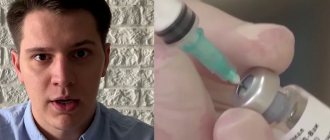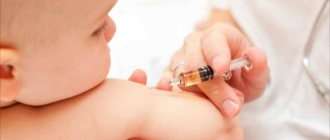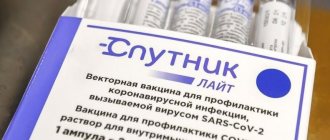Vaccination against whooping cough: take care in a timely manner
It is known that protection against infections acquired by the mother during her life is transmitted to the child through the placenta. But, unfortunately, the mother cannot impart such protection against whooping cough. Therefore, almost immediately after birth, the child finds himself defenseless against a dangerous infection. Tatyana Ivleva, a doctor at the city vaccination office, talks about the incidence of whooping cough and methods of prevention.
Why is vaccination against whooping cough still relevant?
Unfortunately, today we cannot say that we can completely control whooping cough. This is due to the fact that children are vaccinated only up to the age of 4 years. Older children, teenagers and adults eventually lose the immunity that their body has developed as a result of vaccination. Therefore, the incidence of whooping cough remains high among schoolchildren and adults, who, although they suffer from much milder forms of whooping cough, still remain carriers of whooping cough infection. If in the pre-vaccination era children were infected mainly from their peers, today young children often become infected from adults, that is, the source of whooping cough is most often older brothers and sisters attending school, or parents.
Vaccination against whooping cough has been carried out since the 60s of the last century, so modern parents practically do not see the severe course of whooping cough. On the one hand, this indicates the high effectiveness of vaccination programs, but on the other hand, it does not give some parents sufficient grounds to consider whooping cough a serious disease that requires mandatory vaccination against it. However, whooping cough is a dangerous disease, and anyone who has heard of whooping cough should not be convinced of the need to vaccinate their children.
How is the safety of the DTP vaccine, known for its reactogenicity, assessed today?
The DTP vaccine (Adsorbed pertussis-diphtheria-tetanus vaccine) was created more than 50 years ago. Unfortunately, this vaccine, like other whole-cell vaccines, causes the most fear and criticism in terms of reactions that occur to it. However, this particular whole-cell vaccine, which belongs to the first generation of pertussis vaccines, is very effective and provides reliable long-term immunity. Taking these factors into account, and in accordance with WHO recommendations, whole-cell pertussis vaccine remains the main tool in the fight against pertussis to this day.
As for reactions caused by the DTP vaccine, their frequency and severity are greatly exaggerated. Parents often confuse possible complications caused by whooping cough with possible reactions to the vaccine. Complications include severe, persistent health problems resulting from preventive vaccinations (usually paralysis, seizures, and other types of neurological disorders). These situations occur very rarely. Reactions to vaccination are mild external manifestations of the vaccination process (fever, local reactions). It is important to understand that the presence of a reaction in a child is not a pathology, it is a variant of the norm. The most common reaction to the DTP vaccine is a rise in temperature (in 30–50% of cases) and a local reaction in the form of compaction (infiltration) at the site of vaccine administration.
The occurrence of infiltrates is due to the fact that the active substances of the vaccine (antigens) are “implanted” on the carrier, as indicated by the word “adsorbed” in the name of the vaccine, and therefore do not immediately enter the blood, but leave the carrier gradually. The slow supply of antigens allows the body to develop maximum protection against infection. In addition, this mechanism of action makes the vaccine safer and more effective. But it is precisely because the antigens do not immediately leave this “depot” that these local reactions are formed. They are typical for all adsorbed vaccines (DPT, ADS, ADS-M, AS, foreign analogues of DPT). However, as a rule, both temperature and local reactions are normal. This response to the vaccine develops no later than one day after vaccination and lasts no more than three days. Reactions that appear later and last longer are not caused by vaccination, but, for example, by acute respiratory infections, intestinal infections, and so on. In this case, the cause should be sought together with a doctor to rule out a serious illness.
The most unpleasant possible reaction to the administration of whole cell DTP vaccine is neurological manifestations, which occur in a very small number of children (1-2%).
For example, if a child had problems with muscle tone or increased intracranial pressure, these problems may worsen for a period of time after vaccination. Sometimes there may be a delay in development, but, fortunately, thanks to the efforts of neurologists and parents, all functions are soon restored. However, of course, an unpleasant aftertaste from the very existence of these reactions remains not only among parents, but also among doctors. Convulsive reactions are very rare and may occur with the first generation of DPT vaccine. I would like to note that, for example, in Novosibirsk such reactions have not been recorded for a very long time.
What is the effectiveness of the acellular DTP vaccine and its fundamental differences from the first generation whole-cell DTP vaccine?
There has been a lot of discussion around the world about the balance between the benefits and risks of using first-generation DTP vaccines. Some countries, such as Sweden and Japan, refused to vaccinate children against whooping cough and returned to state vaccination programs only after the creation of a new generation of pertussis vaccines.
Today, there is scientific evidence that the causes of encephalopathies that occurred, which were considered to be a consequence of the introduction of the DTP vaccine, were completely different (infectious, genetic diseases). It has also been shown that the DTP vaccine cannot cause severe brain damage.
During the work on the new generation DTP vaccine, the pertussis component of the vaccine was modified, as a result of which it became acellular, or cell-free. Thus, the new generation vaccine provides stable, reliable protection against infection; when used, the risks of neurological reactions are practically reduced to zero, and the risks of any reactions at all are significantly reduced.
For the production of all DPT vaccines, inactivated (“killed”) pertussis microbes are used. For whole cell, the entire microbe (whole cell) is used. For acellular (acellular) - only its fragments. The current generation of pertussis vaccines (acellular) contain from 2 to 5 antigens. For comparison, the first generation vaccine (whole cell) contains 3,000 antigens. It is clear that new generation vaccines are tolerated more comfortably by children. New generation vaccines very quickly entered the vaccination programs of all developed countries. But their cost is, of course, much higher than the cost of the previous generation of vaccines. Therefore, today, under the government program, we only have a whole-cell vaccine. New generation vaccines are approved for use on the territory of the Russian Federation and are freely available. These are 4 vaccines (families of French and Belgian vaccines) that can be done in commercial medical centers. Depending on the components they contain, they have different commercial names. Among them, in addition to the simple DTP vaccine, there are vaccines that contain in one syringe the DTP vaccine and a non-live polio vaccine or DTP and a vaccine against Haemophilus influenzae.
There is also a six-component vaccine, which includes DTP, inactivated polio vaccine, hemophilus influenzae vaccine and hepatitis B vaccine. Moreover, vaccines containing three components are identical in tolerability to vaccines containing six components.
Today, combined vaccines based on DTP are a more promising and correct way, since they represent a more gentle way of protecting against infection. Thus, with the advent of new generation vaccines, pediatricians have gained the opportunity, without the risk of serious reactions, to protect children with various serious diseases from many dangerous infections, in particular from whooping cough.
At what age can children be protected? What is the schedule for vaccination against whooping cough?
Newborns are not immune to whooping cough because they do not receive antibodies against this infection during fetal development. This is a serious problem, and therefore all vaccine programs that exist in the world provide for a fairly early start of vaccination against whooping cough - from 2-3 months of age. In Russia, children begin to be vaccinated against whooping cough at 3 months. The regimen for using the DTP vaccine consists of 4 doses. The first three doses are administered at intervals of 1.5 months (usually at 3, 4, 5 and 6 months), the fourth dose (booster) at 18 months. This set of vaccinations protects children for 5–7 years, so, unfortunately, by school age they lose this immunity. Parents should remember that decent protection against whooping cough is developed only a month after the third vaccination, so it is very important to get it on time. In general, in the world, not only infants, but also preschoolers, adolescents and adults are vaccinated against whooping cough. In developed countries today, the so-called cocoon immunization is very popular, when all members of the family where there is a pregnant woman are vaccinated, thereby creating a kind of “safety cushion” around her and the unborn child, who does not yet have immunity against this disease. In our country, unfortunately, this is not yet possible.
What to do if the calendar dates for the introduction of DTP were not met?
Just continue vaccination. At any interval between DPT doses, the course of vaccinations continues; nothing needs to be started again. It must be remembered that with a significant increase in intervals, the effectiveness of vaccination may decrease. Therefore, you should not postpone vaccination without compelling reasons.
Is any preparation required before DTP vaccination?
For a healthy child, no preparatory measures are required.
If the baby has any chronic disease, it is necessary to discuss the need and scope of examination and medical “cover-up”. I would like to warn parents against self-prescribing medications. You need to know that taking antiallergic drugs significantly reduces the effectiveness of vaccinations. Are there any contraindications for administering the DTP vaccine to a child?
Of course, there are contraindications. This is why an examination by a pediatrician is necessary, who will determine the presence of contraindications to vaccination. The modern generation of (acellular) vaccines has significantly fewer contraindications than whole-cell vaccines.
Help from Sibmed
Back in the 1940s, whooping cough claimed the lives of hundreds of thousands of people every year. After vaccination was introduced, the death toll from this infection dropped to 5 thousand people per year.
The largest outbreak of whooping cough in the last 60 years occurred 2 years ago, in 2013, in the United States. According to authorities, the disease affected more than 48 thousand people, of which 18 died. Let us remind you that in Russia, vaccination against whooping cough is included in the National Calendar of Preventive Vaccinations. In 2014, 3,427 cases of the disease were registered, including 3,290 cases in children under 17 years of age.
Article on the topic:
“What do parents need to know about vaccinations?”
How to prepare for DTP vaccination
DTP is the most reactogenic vaccine; adverse reactions to whooping cough and diphtheria agents are common. Therefore, when preparing, it is necessary to protect the child from infections.
What medications should be given before DPT vaccination?
To prevent allergies (according to indications), antihistamines should be given 1-2 days before the injection.
Before the procedure, drink an antipyretic, this will prevent an increase in temperature and the appearance of convulsions (possible in infants due to fever), and will additionally provide an analgesic and anti-inflammatory effect. Medicines based on paracetamol and ibuprofen are prescribed.
Antihistamines before preparing DTP:
- Suprastin for mild allergy symptoms, ¼ tablet 3 times a day. For a severe reaction - 0.25 ml. a few days.
- Fenistil 2-3 drops, 3 times, up to 5 days.
- Zyrtec can be used for 6 months, dripping into a cleansed nose once a day.
- Zodak from one year onwards, 5 drops 2 times a day.
- Erius after a year, syrup 2.5 ml 1 r/day.
All drugs can reduce complications in the body. The dosage is no more than 2.5 ml; only the number of times per day varies depending on age. It is necessary to solder for several days before and after vaccination.
Antihistamines should only be taken as directed by a doctor if there is a risk of allergies.
Tests before DTP vaccination
Is it necessary to donate blood before DPT? Yes, according to the pediatrician’s direction, there is no need to do this yourself. The analysis will show the presence or absence of pathological changes in the body.
Tests that need to be taken before DTP:
- CBC - complete blood count. White blood cells indicate inflammatory processes; hemoglobin, red blood cells – anemia; platelets – clotting; eosinophils – allergies.
- OAM - general urine test, taken 1-7 days in advance, ideally 3-5 days. Protein levels indicate inflammation.
In case of inflammatory processes, immunization should be postponed until recovery. If eosinophils are elevated, take antihistamines for 7 days (2-3 days before and after).
Neurologist before DPT
Vaccination after consultation with a neurologist is given to premature babies with neurological abnormalities from birth. A specialist may recommend canceling vaccination during an unstable course of the disease with aggravated seizures.
CNS PP, CNS HIP, hypoxia-based encephalopathy without convulsive syndrome are not indicators of withdrawal. Vaccination is delayed with the possibility of replacing the drug with acellular ones: Pentaxim or Infanrix (from 2500 - 3000 rubles/dose).
Komarovsky about DTP vaccination
Dr. Komarovsky is definitely in favor of vaccinations. There are practically no contraindications for completely refusing vaccination; there are cases of delay or replacement with suitable components.
Evgeniy Olegovich recommends that parents study the information about DTP well, do not worry, and be prepared for vaccine reactions.
The main parental preparation for vaccination is a correct lifestyle, including good nutrition, walks, and monitoring the environment.
A healthy person can be vaccinated without any prior preparation.





